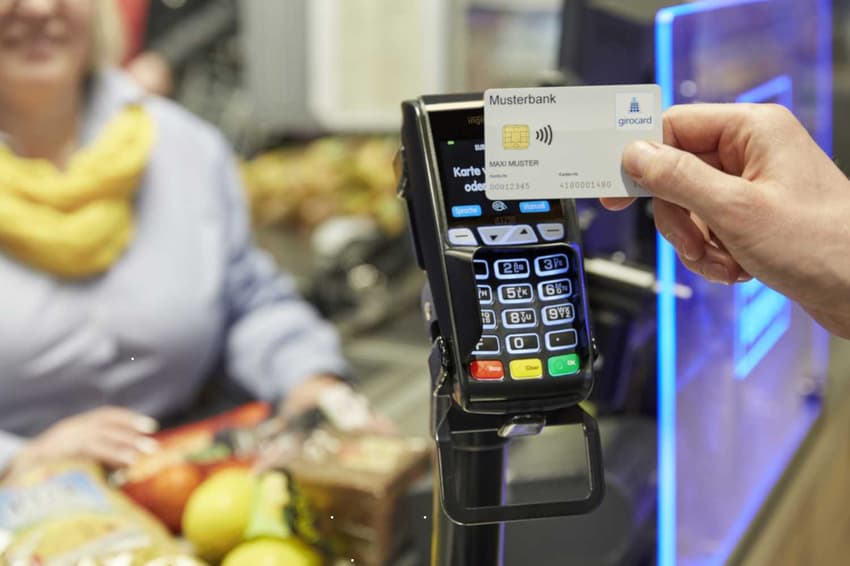Cash-loving Germany switches to contactless payment due to coronavirus fears

Coronavirus concerns have pushed customers across Germany to make the switch to using contactless payment.
More than half of payments are currently being made by card are contactless, compared with 35 percent before the coronavirus crisis hit according to the German Credit Agency (DK).
Contactless payments do not require purchasers to insert their cards into payment machines, instead holding their cards over the terminal. In Germany, entering a PIN is only required when the total amount is above €25.
READ ALSO: Bavaria and Saarland become first German states to impose lockdowns
President of the German Savings Bank Association Helmut Schleweis has said paying via contactless means can minimise the risk of infection.
«However, we recommend contactless payments by card or smartphone. This can significantly minimize the risk of infection. This also complies with the recommendations of the World Health Organization (WHO),” Schleweis told the German Press Agency.
As reported previously by The Local, Germany has remained an outlier in preferring to pay with cash, making it an exception when compared to its neighbours.
2019 was the first year in Germany where more payments were made with card than with cash.
READ ALSO: Card payments outstrip cash for first time in Germany
Due primarily to a desire for privacy and a passionate fear of debt, Germans have historically preferred to pay with cash. Card payments allow financial institutions and potentially others to monitor where your money is being spend, which is something that reminds Germans of the slippery slope of a surveillance state.
German distaste for debt has halted the rollout of credit card payment in the country – the German word for debt ‘Schuld’ also means guilt – meaning that even if you wanted to pay with credit card it would be difficult.
Up until recently, many major supermarkets and retail chains wouldn’t accept credit cards, regardless of the size of the transaction.
Comments (3)
See Also
More than half of payments are currently being made by card are contactless, compared with 35 percent before the coronavirus crisis hit according to the German Credit Agency (DK).
Contactless payments do not require purchasers to insert their cards into payment machines, instead holding their cards over the terminal. In Germany, entering a PIN is only required when the total amount is above €25.
READ ALSO: Bavaria and Saarland become first German states to impose lockdowns
President of the German Savings Bank Association Helmut Schleweis has said paying via contactless means can minimise the risk of infection.
«However, we recommend contactless payments by card or smartphone. This can significantly minimize the risk of infection. This also complies with the recommendations of the World Health Organization (WHO),” Schleweis told the German Press Agency.
As reported previously by The Local, Germany has remained an outlier in preferring to pay with cash, making it an exception when compared to its neighbours.
2019 was the first year in Germany where more payments were made with card than with cash.
READ ALSO: Card payments outstrip cash for first time in Germany
Due primarily to a desire for privacy and a passionate fear of debt, Germans have historically preferred to pay with cash. Card payments allow financial institutions and potentially others to monitor where your money is being spend, which is something that reminds Germans of the slippery slope of a surveillance state.
German distaste for debt has halted the rollout of credit card payment in the country – the German word for debt ‘Schuld’ also means guilt – meaning that even if you wanted to pay with credit card it would be difficult.
Up until recently, many major supermarkets and retail chains wouldn’t accept credit cards, regardless of the size of the transaction.
Join the conversation in our comments section below. Share your own views and experience and if you have a question or suggestion for our journalists then email us at [email protected].
Please keep comments civil, constructive and on topic – and make sure to read our terms of use before getting involved.
Please log in here to leave a comment.